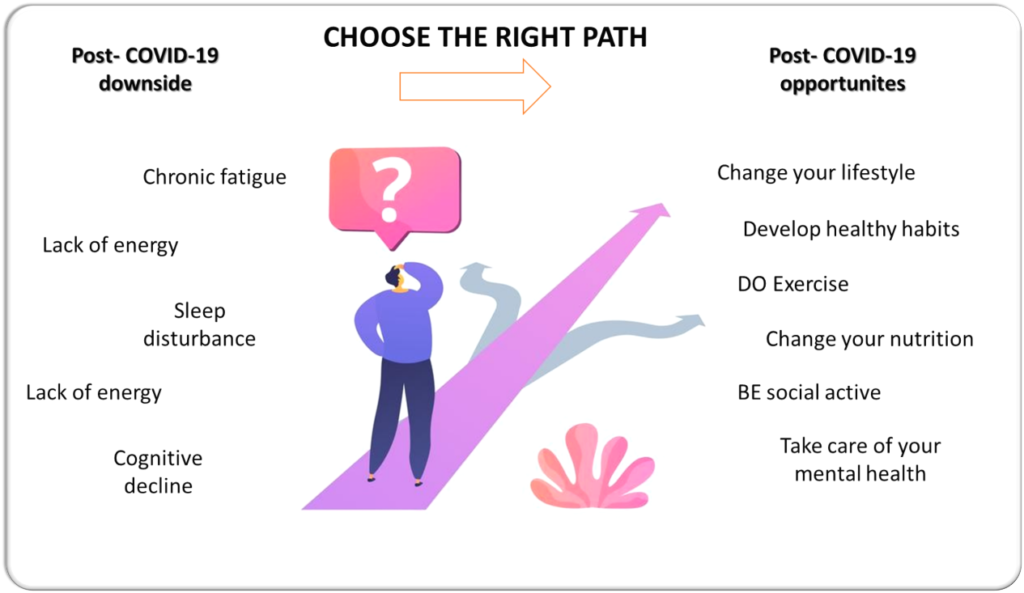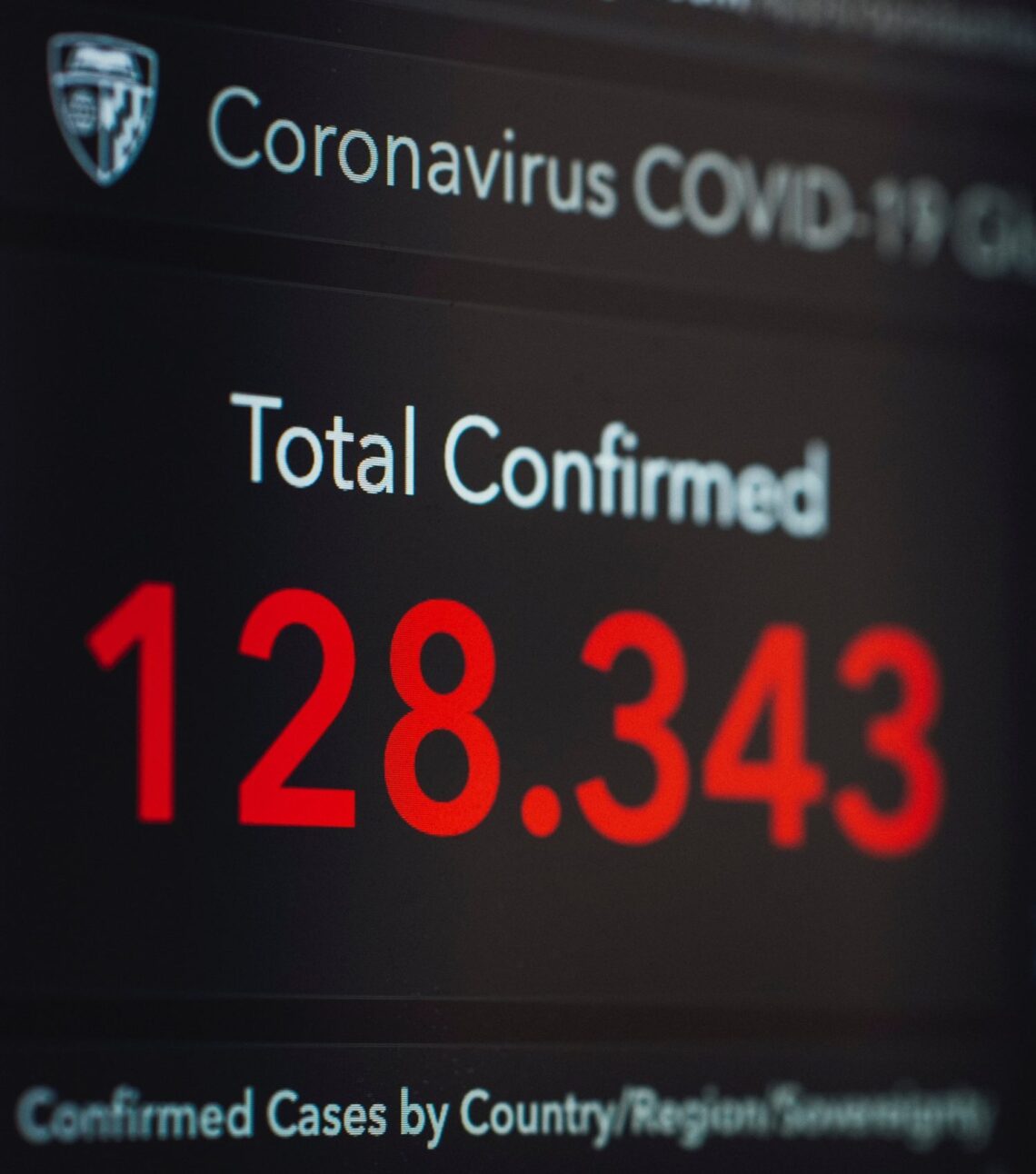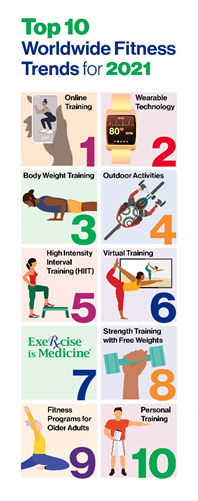Covid 19 strikes our lives and changes them forever. Although this pandemic has several negative aspects, this situation taught us to respect the time spent with our family and to discover some new possibilities. Moreover, it opens a lot of new opportunities. For example, we start to understand that we can do many things using our mobile ups and the internet. For instance, take the fitness industry. Every year ACSM surveys the top fitness trend for that year.1 As we can see, online training and wearable technologies were on the first two spots, followed by bodyweight training. Thus, the times are changing, and we need to change our habits and perspectives too. In this brief article, we want to outline the implication of COVID-19 on our lives, the downsides, and the future possibilities.
POST COVID-19 Syndrome
lthough most people with COVID-19 get better within weeks of illness, some people experience post-COVID conditions. In the recent paper published in Nature,2 a total of 55 long-term effects associated with COVID-19 were identified. Most of the effects, such as fatigue, headache, joint pain, memory loss, dyspnea, are already widespread among the global population and represent substantial public health problems. The primary and most present of those post-COVID syndromes is fatigue. In 58% of post-COVID-19 patients, fatigue is present even after 100 days after bedridden disease.3 The symptoms observed in post-COVID-19 patients that follow the phenomenon of fatigue are pain, compromised sleep, difficulties of engaging and participating in physical activity or cognitive tasks, and impaired immunity. An understanding of fatigue incidence and prevalence is essential for health care professionals who are on a mission to provide pragmatic guidelines concerning fatigue diagnosis and management.4,5
Social Implications of COVID-19
Our society is going on a dramatic change. In a growing new age of possibilities and a modern world, we have to face new challenges that we have not met in the past as a society. Advancements in medicine and improvements in the quality of life have directly extended a person’s lifespan beyond our expectations. We improved medicine, education, communication, and we are in a race to become superhumans. But in this process, we overlook something. We became cold in a personal relationship, and we became lonely and depressed. Covid-19 only deepened this already existing problem. For example, a result from one study on over 1000 participants found that 54% had the psychological impact of the COVID-19 outbreak as moderate or severe; 29% reported moderate to severe anxiety symptoms, and 17% reported moderate to severe depressive symptoms.6 To face and tackle these mental health effects demands a concerted effort from the public and healthcare professionals.7 Daily routines incorporating a healthy lifestyle, hobbies are recommended for the public. In addition, media and healthcare experts should give specific and accurate public health guidance.

Future Possibilities
If previous statements worry you, it means that you are on the right path. To change any problem, the first thing to do is to discover what your problem is. The following steps are our actions in a mission to improve our lives. First, let’s do a fact check. Covid-19 had a certain negative influence on our mental health and social life. But look on the bright side of your life. Start doing things that you have never done before. Start exercising at home or anywhere else. Improve your nutrition and prepare your meal. Spend more time with the ones that you love. Take a long walk and enjoy your life. Life is amazing, and all of us are winners, but we need to do something with our lives. If you need some help in the process, DUDI can help you out.
About Us:
DUDI is an all-sports social marketplace. Our mission is to empower sports communities, and we aim to increase sports participation rate in the GCC region through community engagement and technology.
Reference
- Thompson, W. (2021). FACSM Worldwide Survey of Fitness Trends for 2021, ACSM’s Health & Fitness Journal: 25, 1, 1-10
- Lopez-Leon, S., Wegman-Ostrosky, T., Perelman, C., Sepulveda, R., Rebolledo, P. A., Cuapio, A., & Villapol, S. (2021). More than 50 Long-term effects of COVID-19: a systematic review and meta-analysis. Available at SSRN 3769978.
- Brown, A., & Jason, L. A. (2020). Meta-analysis investigating post-exertional malaise between patients and controls. Journal of health psychology, 25(13-14), 2053-2071.
- Wostyn, P. (2021). COVID-19 and chronic fatigue syndrome: Is the worst yet to come?. Medical hypotheses, 146, 110469.
- Lamprecht, B. Is there a post-COVID syndrome?. Pneumologe (Berl)
- Wang, C., Pan, R., Wan, X., Tan, Y., Xu, L., Ho, C. S., & Ho, R. C. (2020). Immediate psychological responses and associated factors during the initial stage of the 2019 coronavirus disease (COVID-19) epidemic among the general population in China. International journal of environmental research and public health, 17(5), 1729.
- Venkatesh, A., & Edirappuli, S. (2020). Social distancing in covid-19: what are the mental health implications?. Bmj, 369.
- Image: https://www.acsm.org/read-research/trending-topics-resource-pages/acsm-fitness-trends



